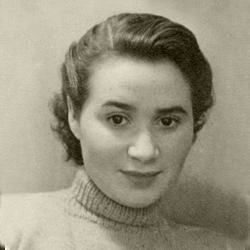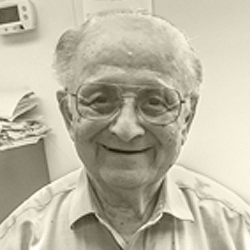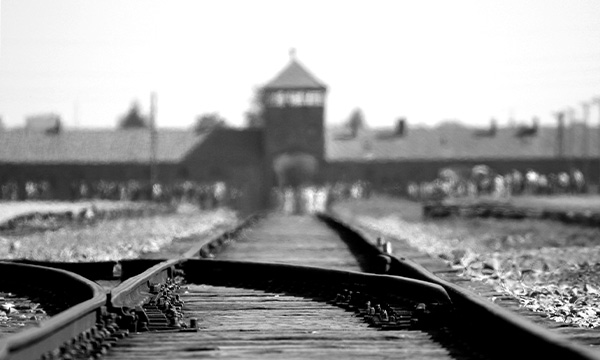Throughout World War II, the German Nazis and their collaborators murdered nearly six million European Jews. This became known as the “Holocaust,” or “Shoah,” meaning “catastrophe” in the Hebrew language.
Jews, perceived by Hitler and the Nazi Party as the source of all of Germany’s problems during that time, were the target of this brutal campaign. Rounded up into ghettos, sent off to concentration camps throughout Europe, and often meeting their deaths at the hands of their Nazi captors in horrifying fashion, this is regarded as one of the darkest periods in modern history.
However, despite the abject horrors they faced -- and the seemingly insurmountable odds of escaping these death camps alive -- the Jewish people endured.
Oklahoma has the honor of being home to some of these survivors, whose lives and legacies are a continual testament to the strength of the human spirit. Together, we’ll meet these remarkable people, listen to their stories of survival, and learn what each of us can do to ensure atrocities like the holocaust never happen again.
Eva Unterman
In the summer of 1939, there was a little girl living in Lodz, Poland who was looking forward to the first grade. Full of the energy of youth, she was excited for the family’s upcoming summer vacation.
It was on that vacation that year that Eva Unterman heard her family members quietly talking about the rumblings of Germany and war.
“I remember that while the adults were sitting and playing their card games, and I was peeking in and listening that eventually there was some whispering going on. They told me I should go to bed and that I had no business being there.
They were talking in worried tones about something happening in Poland, a war perhaps, Germany came up. And then eventually it was decided by the grownups that there was some trouble on the horizon and we should get back home.
I was very disappointed to cut the vacation short, but indeed the packing was done in a hurry and we took a train back to Lodz.”
— Eva Unterman
Chapter 4
Upon arriving home to Lodz -- the second-largest Jewish community in Europe, home to more than 230,000+ Jews -- it was clear, things had dramatically changed. Within days, Nazis swarmed the streets and quickly stripped away the rights of its Jewish citizens, forcing them into ghettos within the city.
“They had total control over everything in the city of Lodz and we Jews were singled out from the very start as the enemy. Edicts were given out, orders were given and I recall that clearly. I was no longer allowed to play with my non-Jewish friends. I was not allowed to play in the park. All of us Jewish citizens of Lodz were not allowed to walk on sidewalks in the center of the city. And then I remember so clearly when we all were ordered to wear these yellow stars of David with the word ‘Jew’ on all of our outer garments, so that we could be easily recognized when we were outdoors.”
— Eva Unterman
Chapter 4
After 4 years in the ghettos of Lodz, Eva and her family were forced to board cattle cars -- train cars typically used to shuttle cattle -- and were put en route with the other Jewish families to Auschwitz, a massive extermination camp. Upon arriving, they were treated horrifically as they were processed by the ruthless SS (“Schutzstaffel,” German for ‘protective echelon’) guards.
“Once we were made to get out of the train, I do remember these people, SS standing there and screaming at us in German yelling for us to get out quickly and using their whips. Men and women were immediately separated.
We were made to go inside where long tables were set up where SS women were sitting there, who were every bit as brutal as the men, and they were processing us.
We had to take all of our clothes off. I had long braids. One woman grabbed my hair and cut them off and the next one shaved my head.
And that was done to all of the women and the few children who were in our group. Then we were led to another building where there were showerheads overhead. We did not know how fortunate we were that water came down on us…
The next morning, we were marched outside and made to stand to be counted. That was the routine in all of the camps. We were counted and then given a rusty bowl that we were to keep. That is what our daily ration of food was poured in. It consisted of water, turnips and potato peels. No spoons mind you. We were not considered human. Animals don’t use spoons…”
— Eva Unterman
Chapter 10
After some time, Eva and her mother were to be transported to the city of Dresden in Germany, to work in a metal factory. It was here, in Dresden, that a joint British and American aerial bombing attack -- famously known as The Dresden Bombings -- was carried out. In the calamity of the bombing, a hole was torn into the side of the metal factory, allowing the captive Jews an opportunity for escape.
Though some managed to successfully flee in the din of the bombing, the majority of the captives, including Eva and her mother, were once again rounded up by the Germans and made to march onward to the ghetto camp of Theresienstadt. This agonizing on-foot trek was known as “the Death March.”
“And we walk along the river for days and days and people who can no longer walk collapsed and are shot on the spot. We were weak and sick and hungry but we kept walking. It seemed like an eternity… And while we were walking, a nail in my left wooden shoe, I still have the wooden shoes, embedded itself on the side of my left foot. I was in terrible pain and I begged my mother, we always walked in groups of five. It’s called a Death March. We were dragging along. We weren’t marching.
My mother was on my right side and three other people were walking with us. I begged her to stop because I was in such pain. She asked the SS woman, she was not German, she was from the Ukraine, if we could stop for a minute so she could pull that nail from out of my foot and get it with a rock out of my shoe. And the SS woman said, ‘No.’ in German. She shouted ‘No! And you don’t ask again!’
And mother kept pulling me along until we finally got to this stadium where she was able to get the nail out of my foot and out of my shoe. Some rag was torn off of what we were wearing wrapped around it. How I didn’t get a blood infection I will never know. I still have a scar there, to this day, a mild reminder.”
— Eva Unterman
Chapter 16
Shortly arriving in Theresienstadt, after marching for more than 11 days, Russian soldiers valiantly arrived, liberating the camp and telling the Jewish prisoners that they were finally free.
“‘You’re free.’ The Russian soldiers told us, ‘You’re free.’ Well, what now? What happens? The first thing, like I said, was eating and then people started searching for their relatives… In this incredible chaos, we found out that my father was there with the men on the other side…It was, just…really there weren’t words exchanged, just hugging and crying, hugging and crying.”
— Eva Unterman
Chapter 17
In reflection, Eva credits much of her survival to the strength of her mother. As to why she continues to speak about her experiences, Eva puts it plainly:
“This is an obligation for me. For many years, I, and others did not speak about this horrendous past. We didn’t speak and no one asked…
Even though it is not mandated in Oklahoma, I am committed to telling the story to young people to impress upon them how we are capable of doing these incredible atrocities toward other human beings and hoping against hope … young people will learn from our experience to speak up early on.
To care about the other person, to become what my tradition teaches me human beings should be. We are all God’s children, all on this little planet together. And if we are to survive as a species, we must learn not only to tolerate, but also to respect one another. I hope that our information and our testimony will in some way lead to making that a reality.”
— Eva Unterman
Chapter 27
Sherman Ray
As a boy, Sherman Ray’s father told him plainly that he wouldn’t be able to afford college and that, for Sherman to make a living, he would have to learn a trade.
“So he told me one thing … and I will never forget and I tell a lot of people. He said, ‘Son, I cannot send you to college. Learn a trade, wherever you will be. All you need is simple and then you can make a living.’
I was a young boy, eight, nine, ten. When I was eleven, twelve, you know, after school, I used to come home. My father used to have two or three boys learning the tailoring.”
— Sherman Ray
Chapter 2
Naturally, Sherman picked the trade of his father and his grandfather: tailoring. Little did Sherman know that in the years following, this trade would be the very thing that would save his life and allow him to survive the horrors of the Auschwitz death camp.
As the Germans began their invasion of Poland in 1939, Sherman and his family weren’t immediately affected. However, as the Germans continued to encroach deeper into his boyhood home of Hajnówka, their presence and brutality could soon be ignored no longer.
“Well, number one, as long as we didn’t see the Germans came for three days, they didn’t do any harm. Well, the second time after eighteen months then we started feeling.
You see, Bialystok was a lot of boys, Jewish boys, they were throwing rocks at the Germans. They didn’t forget.
Second time they came to Bialystok, the second time, they took seven thousand Jews in the synagogue, women, children, kerosene and set a fire. I never could forget.
I was hiding in a little chicken shed, my father and me. We was hiding. They then rolled up the sleeve like butchers. The machine guns laid out in Poland every church in the middle of the town.”
— Sherman Ray
Chapter 3
Soon after, the Russian army in the nearby city of Bialystok occupied Sherman’s town of Hajnówka. Under their occupation, Sherman begins to train with their regiments. Unfortunately, the Russian army falls under the overwhelming force of the German artillery, with the Nazis soon rounding up and imprisoning the Polish citizens and Russian soldiers alike.
“Three and a half days -- you can’t imagine how many tanks and the big, big artillery. I never saw such a big tanks in my life, like a house, coming into Poland. And the best of the German took everything over. And took the soldiers and put them in camps.”
— Sherman Ray
Chapter 3
Captured along with his family, Sherman knew that the Nazi’s didn’t have anything good in store for him and his kin. Quickly shuttled onto a train, Sherman wracked his brain for a way off of the locomotive. His only option was to jump. The only problem? His family didn’t trust Sherman’s inclination about the Nazi’s true intent, despite Sherman’s pleas.
“Oh, I begged them to jump. They thought they were going to a resort. I knew, I said, ‘They’re going to kill you.’ Their allegiance cost so many problems, you have no idea. I said, ‘I am jumping. I said to myself, ‘If I have to get killed by a bullet but I don’t want to go to the gas chamber.’”
— Sherman Ray
Chapter 4
This was the last time he’d see his father, mother, and siblings.
Surviving the jump from the train, Sherman braved the wilderness and -40° temperatures, living off of the land and what little aid the nearby villagers could safely provide. For more than a year, Sherman would live in the forest and endure these harsh conditions, but eventually took up shelter in the city of Bialystok where he worked in a Nazi factory as a tailor before being again forced on the train to Auschwitz.
Now imprisoned within Auschwitz, Sherman felt certain that his days were numbered. While there aren’t words fit to describe the hellish conditions of the camp, Sherman recalls the horrors he endured:
“Yeah. When I came to Auschwitz I say, ‘No way I will get out of here.’ You could see flame, the flesh from the human body. And it smelled like you take a salted towel and you fry. And the [human] ashes was falling down… And the orchestra was playing not to hear the screaming from the gas chambers…
The people by the door, after they gassed it, they dropped the wall. It was huge guys, special, with bends, pulling the gold teeth out… No humanity, no feeling for humans at all.”
— Sherman Ray
Chapter 5
Among these horrors were being forced to shower with soap made from the flesh of executed Jewish prisoners, seeing children brutally dismembered, and hearing the blood-curdling screams of the people being executed in the gas chambers of the camp.
Still surviving at a mere 75 pounds of body weight -- kept alive purely to help work in the camp, Sherman clung to hope. Hearing word of the American daytime bombing runs and those of the English armies at night, the embers of hope stayed alight.
Over time, as the Germans recognized they were losing the war, they began moving healthier prisoners to the Dachau camp. Made to march to the camp, Sherman’s group temporarily hunkered down in the forest before continuing their hellish trek. But, upon awakening, Sherman and his group realized that the Nazi SS guards were nowhere to be seen.
“Anyway, after three, four hours, the F-boats and the American 45th division. The boats, the trucks, they came and I hardly could walk, you know. They took us to Munich.”
— Sherman Ray
Chapter 6
Freed, Sherman was given provisions and housing by the Allied forces in Munich. Over time, now with sufficient food and medical attention, Sherman returned to a healthy weight and, after 4 years, was allowed the opportunity to relocate to Canada, Australia, or the United States. Without hesitation, Sherman chose the US.
Coming in through Ellis Island in New York at the end of 1949, Sherman was quickly informed that his immigration papers stated he had to be relocated to the American West -- Oklahoma City, in fact.
Arriving in Oklahoma City, he quickly finds work as a tailor and begins establishing his new life. Taking English classes, citizenship classes, and learning everything he could about his new home country, Sherman flourishes.
Finally making his own way to Tulsa soon thereafter, Sherman works for years as a master tailor, eventually opening up Ray’s Tailor Shop in Tulsa, a longtime mainstay of the city’s garment industry.
Reflecting on his life, Sherman harkens to the love of his home, America.
“If I have to give my life for this country I will. American people are the most charitable people in the world. It’s still the best country in the world.”
— Sherman Ray
Chapter 14
And thanks to incredible people like Sherman Ray and Eva Unterman, this country continues to be the greatest country in the world
Conclusion: What We’ve Learned and How You Help Stomp Out Anti-semitism
As we’ve visited with these incredible survivors, it’s important that we don’t just listen to their stories, but truly learn from them as well. As we reflect on the experiences of Eva Unterman and Sherman Ray, let’s look at the key lessons they’ve shared with us:
No matter how advanced and civilized we think ourselves to be, human beings are capable of atrocities.
Don’t stay silent when you witness injustice. Bravely speaking up may be difficult, but it’s the only thing that keeps hateful rhetoric from spreading.
Mutual respect for your fellow human beings, regardless of religion, sexual orientation, color -- you name it, is vital for our survival as a species.
The United States is one of the greatest countries in the world because of its people and our mutual commitment to stay vigilant against the ever-present threat of facism and hateful thinking.
Before concluding our time with one another, I invite you to watch a powerful reminder of why it’s vital that every American do their part to fight against the hatred and discrimination of one’s fellow man.
Shortly after the end of World War II, the United States launched a powerful campaign to help future generations recognize the signs of facism and hateful, un-American thinking that seeks to turn a nation’s people against one another.
Thank you for joining me in learning from these incredible Oklahomans. The preservation and sharing of these stories is made possible only through gifts from readers like you. Gifts of any amount help us continue our mission to preserve Oklahoma’s legacy one voice at a time.


